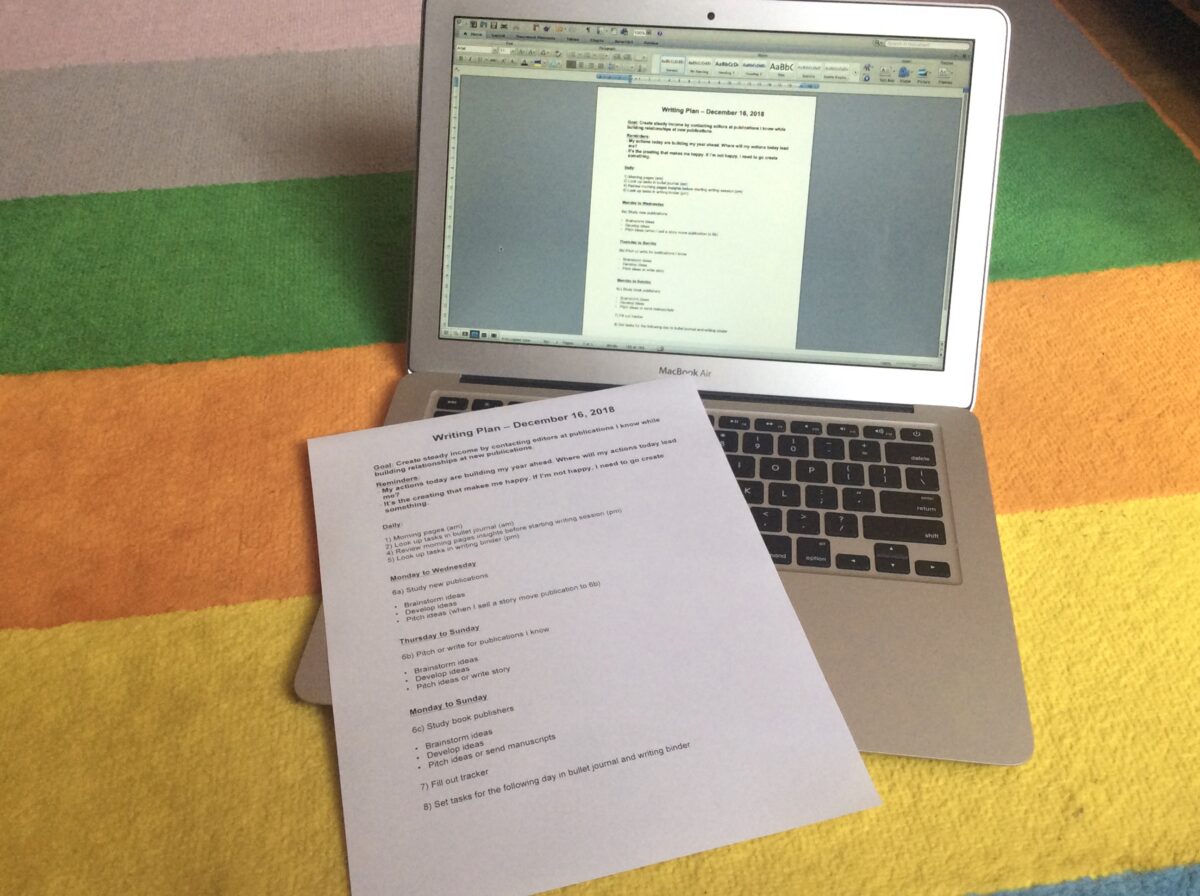Planning is something I’m really good at. I love makings lists. I love creating tasks and goals. And I really love imagining winning outcomes. But the actual implementing? Not so much.
That’s because what looks great on paper, often doesn’t match my reality. Sure, pitching a new magazine, contacting an editor I’ve worked with before, and researching book publishers is easy to accomplish on a daily basis during my long summer break.
But once I’m back at work, expecting to come home and turn myself into a superstar writer is not realistic. I might manage it once in a while, but certainly not every day of the week.
On the other hand, it’s more than possible I can hit all of these goals on a weekly basis. Since my last blog post, I looked at my detailed plan and spread it out over an entire week. Over the last few months, I’ve updated it several times to make sure it meets my needs and helps me reach my goals.
Here’s what my plan looks like at the moment.
Writing Plan
Written in big, bold letters at the top of the page followed by the date. I like to date my plan so I can see when I last updated it.
Goal
What am I trying to achieve? This is important. Without a goal, a plan has no meaning. In one sentence, I nail down exactly what I want to accomplish with my writing.
Reminders
Here I jot down a few things I want to keep in mind. It gives me that little extra boost I sometimes need to put my plan into action and avoid procrastinating.
Daily
These are tasks that I feel must be done every day. I keep them to the barest minimum so they don’t take up the whole of my writing time.
Monday to Wednesday / Thursday to Sunday
I spilt my week in half. Each half gets specific tasks. During the first half, I study new magazines. When I find mags I want to write for, I come up with ideas and send them a pitch. During the second half, I pitch ideas to editors I’ve worked with before. Since I’m more likely to hear back from these editors with a positive response, I save the weekend to create the bulk of the actual stories.
Monday to Sunday
If I still have enough energy after I’m finished with the above tasks, I then set to work studying book publishers. I give myself the whole week since I don’t expect to get much done every night. But if all goes well, I’ll have at least one pitch ready to send by the time Sunday comes along.
The very last thing I do before stopping for the night is to set my tasks for the following day based on what I’ve managed to accomplish and what still needs to be done.
Following Up
At the end of each week I sit down with my Weekly Follow Up chart and take a moment to reflect on my writing process. I ask myself three questions:
- What worked?
- What didn’t work?
- What needs improvement?
Notes
At the end of my chart, there’s a space where I jot down notes on anything that may have helped or got in the way of my goals. Did anyone approach me with a writing project out of the blue? Did I get knocked out with a bad cold? Did I waste too much time on Facebook?
Every time I feel it’s necessary, I adjust my plan, rewrite it, and change the date. I save all of my plans so that later on I’ll be able to refer to them if needed.
Now all that’s left to do — and this seems to be a recurring problem for me — is to figure out how I can fit in writing more blog posts. Because one thing I learned is that if it’s not in the plan, it simply won’t get done!
Hope this planning tip helps you prepare for the new year.
Happy planning!

